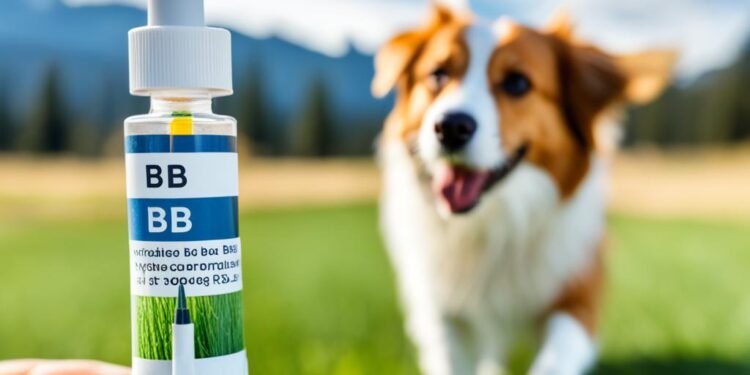Protect Your Pup: BBB Vaccine for Dogs Explained
As a responsible pet owner, one of the most important things you can do for your dog is to ensure they are protected from various health risks. Vaccines play a critical role in safeguarding your dog from harmful diseases, and among these is the BBB vaccine for dogs. This article will provide you with a comprehensive understanding of the BBB vaccine, its importance, and how it contributes to your pup’s overall health and well-being.

As a responsible pet owner, one of the most important things you can do for your dog is to ensure they are protected from various health risks. Vaccines play a critical role in safeguarding your dog from harmful diseases, and among these is the BBB vaccine for dogs. This article will provide you with a comprehensive understanding of the BBB vaccine, its importance, and how it contributes to your pup’s overall health and well-being.
What is the BBB Vaccine for Dogs?
The BBB vaccine for dogs is a relatively newer vaccine designed to protect against a range of serious diseases that can affect your dog’s health. The acronym "BBB" stands for Bordetella bronchiseptica, Canine Parainfluenza Virus, and Canine Adenovirus, which are the three main pathogens that this vaccine targets.
Each of these pathogens can lead to respiratory infections, making them a significant health concern for dogs, especially in environments where they are in close contact with other dogs, such as boarding kennels, dog parks, or grooming facilities.
Why is the BBB Vaccine Important?
The BBB vaccine for dogs is essential for several reasons:
-
Protection Against Respiratory Diseases: The pathogens targeted by the BBB vaccine for dogs are primarily responsible for causing respiratory infections in canines. These infections can range from mild coughs to severe conditions like pneumonia. In some cases, if left untreated, they can even be fatal. The vaccine helps strengthen your dog’s immune system and prevents these infections from taking hold.
-
Prevention of Kennel Cough: One of the most common conditions the BBB vaccine addresses is kennel cough, a contagious respiratory disease that spreads quickly in places where dogs gather. It is caused by a combination of the Bordetella bronchiseptica bacteria and the Canine Parainfluenza virus. Kennel cough is highly infectious and can cause symptoms like a dry, honking cough, nasal discharge, fever, and loss of appetite. The vaccine significantly reduces the risk of your dog contracting kennel cough, especially when they are in contact with other dogs.
-
Safe Socialization and Travel: If you take your dog to dog parks, boarding facilities, or groomers, the BBB vaccine is crucial. These places can be breeding grounds for contagious diseases, and vaccinated dogs are less likely to become infected. Socializing your dog safely can improve their quality of life and ensure they stay healthy.
-
Long-Term Health Benefits: Vaccinating your dog with the BBB vaccine can have long-term health benefits. By preventing infections caused by these pathogens, you can avoid the need for costly treatments, medications, and veterinary visits. Moreover, it helps your dog lead a more active and comfortable life without the burden of chronic health issues.
How Does the BBB Vaccine Work?
The BBB vaccine for dogs works by introducing small, inactivated portions of the pathogens into your dog’s immune system. This process allows the dog’s body to recognize and develop immunity against these specific viruses and bacteria. If your dog is later exposed to any of these pathogens, their immune system will already know how to fight them off, preventing infection or minimizing its severity.
The vaccine is usually administered through an intranasal spray or injectable form, depending on your veterinarian’s recommendation. The intranasal spray is often preferred for the Bordetella component of the vaccine, as it provides more localized protection to the respiratory tract. The injectable form typically includes all three components (Bordetella, Canine Parainfluenza Virus, and Canine Adenovirus) and provides broader immunity.
When Should Your Dog Receive the BBB Vaccine?
Vaccination schedules vary depending on your dog’s age, lifestyle, and risk of exposure to certain diseases. However, the general guideline is:
-
Puppies: Puppies typically begin their vaccination schedule at around 6 to 8 weeks of age. They will need a series of vaccinations, including the BBB vaccine, to ensure they are adequately protected. Most puppies will receive their first dose of the BBB vaccine at 8 to 12 weeks of age.
-
Adults: Adult dogs that have not received the BBB vaccine previously should be vaccinated as soon as possible. After the initial vaccination, the vaccine should be boosted every 6 to 12 months, depending on your vet’s recommendations and your dog’s risk factors.
-
Dogs in High-Risk Environments: If your dog spends time in dog parks, boarding kennels, or other locations with many other dogs, your vet may recommend more frequent vaccinations to ensure ongoing protection.
Is the BBB Vaccine Safe for Dogs?
Yes, the BBB vaccine for dogs is generally considered safe for most dogs. As with any vaccine, there may be some minor side effects, but these are typically short-lived and mild. Common side effects can include:
-
Mild lethargy
-
Reduced appetite
-
Mild nasal discharge (especially after the intranasal form)
Serious side effects are rare but can include allergic reactions. If you notice any unusual symptoms such as swelling, difficulty breathing, or persistent vomiting after the vaccination, you should contact your veterinarian immediately.
Can the BBB Vaccine Cause Side Effects?
While side effects are uncommon, some dogs may experience mild symptoms following the BBB vaccine. These symptoms usually go away within a few days and are nothing to be concerned about. Here are some potential side effects:
-
Mild lethargy: Your dog may feel tired or sleepy for a short period after receiving the vaccine.
-
Slight fever: It’s common for dogs to have a mild fever after vaccination, which should resolve within a day or two.
-
Slight nasal discharge: If the intranasal form of the vaccine is used, some dogs may experience mild nasal discharge or sneezing.
If your dog experiences any symptoms beyond mild side effects or if you have any concerns, be sure to consult your veterinarian.
Conclusion: Is the BBB Vaccine Right for Your Dog?
The BBB vaccine for dogs is an essential preventive measure for protecting your dog against serious respiratory diseases. By vaccinating your dog with the BBB vaccine, you are helping to safeguard their health, improve their quality of life, and reduce the risks of highly contagious conditions like kennel cough.
If your dog is in a high-risk environment or if you want to ensure they are fully protected, it’s a good idea to consult your veterinarian about the BBB vaccine and its suitability for your pup. Early vaccination can make a huge difference in keeping your dog healthy and active for many years to come.
At Puppadogs, we believe in providing pet owners with the best possible care and information for their furry companions. Ensure your dog’s health and happiness by staying up to date with vaccinations like the BBB vaccine. Always consult your veterinarian for the best vaccination plan tailored to your dog’s needs.
FAQs About the BBB Vaccine for Dogs
1. Is the BBB vaccine mandatory for all dogs?
While it is not mandatory by law, it is highly recommended for dogs that interact with other dogs in social settings such as parks, boarding facilities, or grooming salons.
2. How often should my dog receive the BBB vaccine?
After the initial vaccination series, it’s typically recommended to get a booster shot every 6 to 12 months, depending on your veterinarian’s advice and your dog’s risk factors.
3. Can my dog still get kennel cough after receiving the BBB vaccine?
While the vaccine significantly reduces the risk, it does not guarantee complete immunity. However, vaccinated dogs usually experience less severe symptoms if they do get infected.
By educating yourself about the BBB vaccine for dogs, you can make informed decisions that help protect your furry friend from preventable diseases and keep them happy and healthy for years to come.
What's Your Reaction?
 Like
0
Like
0
 Dislike
0
Dislike
0
 Love
0
Love
0
 Funny
0
Funny
0
 Angry
0
Angry
0
 Sad
0
Sad
0
 Wow
0
Wow
0


















































